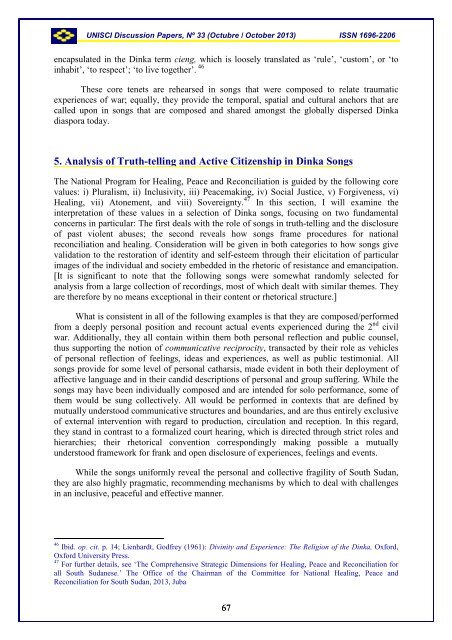UNISCI - Universidad Complutense de Madrid
UNISCI - Universidad Complutense de Madrid
UNISCI - Universidad Complutense de Madrid
Create successful ePaper yourself
Turn your PDF publications into a flip-book with our unique Google optimized e-Paper software.
<strong>UNISCI</strong> Discussion Papers, Nº 33 (Octubre / October 2013) ISSN 1696-2206encapsulated in the Dinka term cieng, which is loosely translated as ‘rule’, ‘custom’, or ‘toinhabit’, ‘to respect’; ‘to live together’. 46These core tenets are rehearsed in songs that were composed to relate traumaticexperiences of war; equally, they provi<strong>de</strong> the temporal, spatial and cultural anchors that arecalled upon in songs that are composed and shared amongst the globally dispersed Dinkadiaspora today.5. Analysis of Truth-telling and Active Citizenship in Dinka SongsThe National Program for Healing, Peace and Reconciliation is gui<strong>de</strong>d by the following corevalues: i) Pluralism, ii) Inclusivity, iii) Peacemaking, iv) Social Justice, v) Forgiveness, vi)Healing, vii) Atonement, and viii) Sovereignty. 47 In this section, I will examine theinterpretation of these values in a selection of Dinka songs, focusing on two fundamentalconcerns in particular: The first <strong>de</strong>als with the role of songs in truth-telling and the disclosureof past violent abuses; the second reveals how songs frame procedures for nationalreconciliation and healing. Consi<strong>de</strong>ration will be given in both categories to how songs givevalidation to the restoration of i<strong>de</strong>ntity and self-esteem through their elicitation of particularimages of the individual and society embed<strong>de</strong>d in the rhetoric of resistance and emancipation.[It is significant to note that the following songs were somewhat randomly selected foranalysis from a large collection of recordings, most of which <strong>de</strong>alt with similar themes. Theyare therefore by no means exceptional in their content or rhetorical structure.]What is consistent in all of the following examples is that they are composed/performedfrom a <strong>de</strong>eply personal position and recount actual events experienced during the 2 nd civilwar. Additionally, they all contain within them both personal reflection and public counsel,thus supporting the notion of communicative reciprocity, transacted by their role as vehiclesof personal reflection of feelings, i<strong>de</strong>as and experiences, as well as public testimonial. Allsongs provi<strong>de</strong> for some level of personal catharsis, ma<strong>de</strong> evi<strong>de</strong>nt in both their <strong>de</strong>ployment ofaffective language and in their candid <strong>de</strong>scriptions of personal and group suffering. While thesongs may have been individually composed and are inten<strong>de</strong>d for solo performance, some ofthem would be sung collectively. All would be performed in contexts that are <strong>de</strong>fined bymutually un<strong>de</strong>rstood communicative structures and boundaries, and are thus entirely exclusiveof external intervention with regard to production, circulation and reception. In this regard,they stand in contrast to a formalized court hearing, which is directed through strict roles andhierarchies; their rhetorical convention correspondingly making possible a mutuallyun<strong>de</strong>rstood framework for frank and open disclosure of experiences, feelings and events.While the songs uniformly reveal the personal and collective fragility of South Sudan,they are also highly pragmatic, recommending mechanisms by which to <strong>de</strong>al with challengesin an inclusive, peaceful and effective manner.46 Ibid. op. cit. p. 14; Lienhardt, Godfrey (1961): Divinity and Experience: The Religion of the Dinka, Oxford,Oxford University Press.47 For further <strong>de</strong>tails, see ‘The Comprehensive Strategic Dimensions for Healing, Peace and Reconciliation forall South Sudanese.’ The Office of the Chairman of the Committee for National Healing, Peace andReconciliation for South Sudan, 2013, Juba67
















